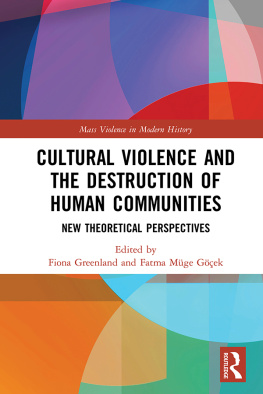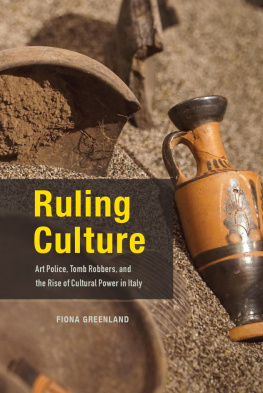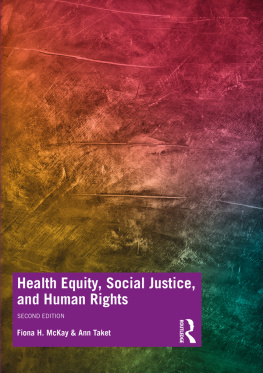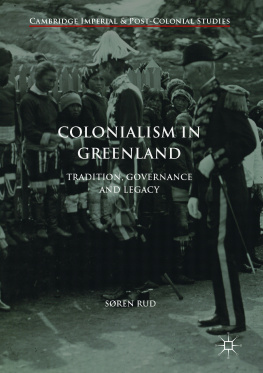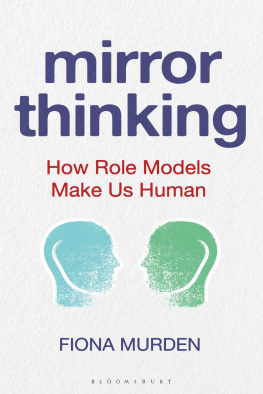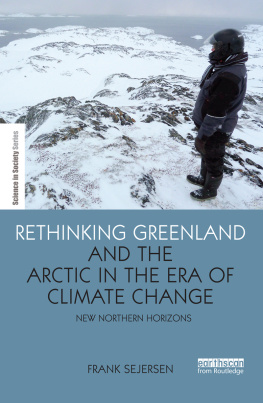Cultural Violence and the Destruction of Human Communities
This volume brings together leading sociologists and anthropologists to break new ground in the study of cultural violence. First sketched in Raphael Lemkins seminal writings on genocide, and later systematically defined by peace studies scholar Johan Galtung, the concept of cultural violence seeks to explain why and how language, symbols, rituals, practices, and objects are so frequently in the crosshairs of socio-political change. Recent conflicts in the Middle East, Africa, and Central Asia, along with renewed public interest in the repertoire of violence applied to the control and erasure of indigenous populations, highlights the gaps in our understanding of why cultural violence occurs, what it consists of, and how it relates to other forms of collective violence.
Fiona Greenland is Assistant Professor of Sociology at the University of Virginia, USA.
Fatma Mge Gek is Professor of Sociology and Womens Studies at the University of Michigan, USA
Mass Violence in Modern History
Series Editors:
Alexander Korb, University of Leicester, UK and Uur mit ngor, Utrecht University, the Netherlands
Despite the horrors of nineteenth-century conflicts, including the US Civil War and the Napoleonic Wars, it was not until the twentieth century that mass killing was conducted on an industrialized scale. While the trenches of Flanders and the atomic bomb were major manifestations of this, mass violence often occurred outside the context of conventional war or away from the traditional battlefield. Research has understandably tended to focus on major events and often within a binary superpower narrative. In fact, instances of mass violence are often hard to pin down as well as being little known, and involving civilians and citizens of a wider range of territories than is publicized. The books in this series shed light on mass violence in the modern era, from Armenia to Rwanda; from Belarus to Bosnia-Herzegovina and many points in between.
The White Terror
Antisemitic and Political Violence in Hungary, 19191921
Bla Bod
The Holocaust in the Romanian Borderlands
The Arc of Civilian Complicity
Mihail I. Poliec
The Construction of National Socialist Europe During the Second World War
Raimund Bauer
Cultural Violence and the Destruction of Human Communities
New Theoretical Perspectives
Edited by Fiona Greenland and Fatma Mge Gek
For more information about this series, please visit: www.routledge.com/Mass-Violence-in-Modern-History/book-series/MASSVIOLENCE
First published 2020
by Routledge
2 Park Square, Milton Park, Abingdon, Oxon OX14 4RN
and by Routledge
52 Vanderbilt Avenue, New York, NY 10017
Routledge is an imprint of the Taylor & Francis Group, an informa business
2020 selection and editorial matter, Fiona Greenland and Fatma Mge Gek; individual chapters, the contributors
The right of Fiona Greenland and Fatma Mge Gek to be identified as the authors of the editorial material, and of the authors for their individual chapters, has been asserted in accordance with sections 77 and 78 of the Copyright, Designs and Patents Act 1988.
All rights reserved. No part of this book may be reprinted or reproduced or utilised in any form or by any electronic, mechanical, or other means, now known or hereafter invented, including photocopying and recording, or in any information storage or retrieval system, without permission in writing from the publishers.
Trademark notice: Product or corporate names may be trademarks or registered trademarks, and are used only for identification and explanation without intent to infringe.
British Library Cataloguing-in-Publication Data
A catalogue record for this book is available from the British Library
Library of Congress Cataloging-in-Publication Data
Names: Greenland, Fiona, editor. | Mge Gek, Fatma editor.
Title: Cultural violence and the destruction of human communities : new theoretical perspectives / edited by Fiona Greenland and Fatma Mge Gek.
Description: 1 Edition. | New York : Routledge, 2020. | Series: Mass violence in modern history | Includes bibliographical references and index.
Identifiers: LCCN 2020006608 (print) | LCCN 2020006609 (ebook) | ISBN 9781138577336 (hardback) | ISBN 9781351267083 (ebook)
Subjects: LCSH: ViolenceCross-cultural studies. | ViolenceSocial aspects. | CommunitiesSocial aspects.
Classification: LCC HM886 .C8475 2020 (print) | LCC HM886 (ebook) | DDC 303.6dc23
LC record available at https://lccn.loc.gov/2020006608
LC ebook record available at https://lccn.loc.gov/2020006609
ISBN: 978-1-138-57733-6 (hbk)
ISBN: 978-1-351-26708-3 (ebk)
Fiona Greenland is Assistant Professor of Sociology at the University of Virginia. She studies meaning-making and cultural lineages, using concepts and methods from cultural sociology, comparative and historical sociology, and art history. Her book, Ruling Culture: Art Police, Tomb Robbers, and the Rise of Cultural Power in Italy, is forthcoming with the University of Chicago Press. It situates the emergence of national symbols and icons in Italys longer historical entanglements of cultural elites, state officials, and tombaroli, or tomb robbers. Recent research includes a multi-year project, funded by the National Science Foundation, to study the interplay of cultural violence and civilian casualties in the Syrian civil war. Greenlands work has been published in Sociological Theory, Qualitative Sociology, Nations and Nationalism, and the International Journal of Cultural Property, among other outlets. She was a classical archaeologist for 10 years before finding sociology.
Fatma Mge Gek is a Professor of Sociology and Womens Studies at the University of Michigan. Her research focuses on the comparative analysis of history, politics, and gender in the first and third worlds. She critically analyzes the impact of processes such as development, nationalism, religious movements and collective violence on minorities. Her published works include East Encounters West: France and the Ottoman Empire in the 18th Century (1987), Reconstructing Gender in the Middle East: Tradition, Identity, Power (1994 co-edited with Shiva Balaghi), Rise of the Bourgeoisie, Demise of Empire: Ottoman Westernization and Social Change (1996), Political Cartoons in the Middle East (1998), Social Constructions of Nationalism in the Middle East (2002), The Transformation of Turkey: Redefining State and Society from the Ottoman Empire to the Modern Era (2011), and A Question of Genocide: Armenians and Turks at the End of the Ottoman Empire (2011 co-edited with Ronald Grigor Suny and Norman Naimark).
Damien Short is Director of the Human Rights Consortium (HRC) and a Professor of Human Rights and Environmental Justice at the School of Advanced Study. He has spent his entire professional career working in the field of human rights and environmental justice, both as a scholar and advocate. He has researched and published extensively in the areas of indigenous peoples rights, genocide studies, reconciliation projects, and environmental human rights. He is currently researching the human rights impacts of extreme energy processes. Professor Short is a regular academic contributor to the United Nations Expert Mechanism on the Rights of Indigenous Peoples and an academic consultant for the Ethical Trade Task Force of the Soil Association.

